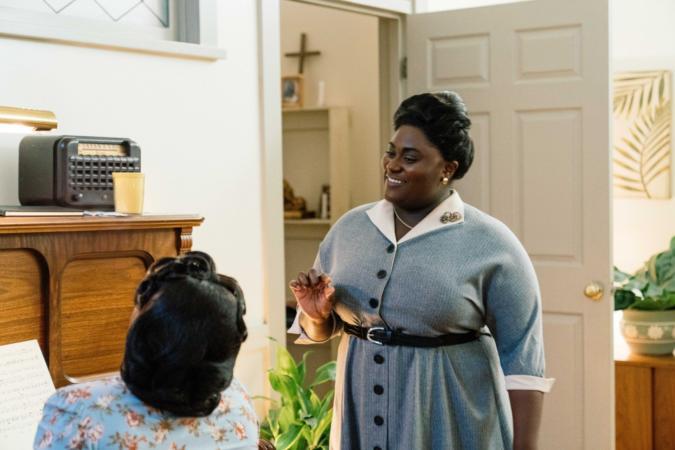There are several projects in the works on gospel music great Mahalia Jackson, and Lifetime has the distinction of putting out the first one. The network tapped Danielle Brooks to star as the icon, and Brooks is the reason that two of the film’s other stars, Joaquina Kalukango and Jason Dirden, signed on for the project as well.
“Quite honestly, it was Danielle Brooks,” Kalukango said in an interview with Shadow and Act when asked about joining the project. “She’s a dear friend of mine, so when she told me this was a passion project of hers, I couldn’t say no.”
Dirden added, “If you look at her and her abilities – if you look at her physically, you see that she’s perfect for the role. And then if you look at her life, you say she’s absolutely perfect for it. Then there are certain roles and certain people in history and then another generation comes along and you say that person is perfect to play that historical figure.”
He plays the role of Reverend Russell Roberts, a music executive who snatches Jackson’s heart. The actor said that despite his excitement to participate in the project, he was ashamed he knew so little about Jackson’s personal life.
“I was ignorant about her personal life and once I learned about it, I don’t understand why I didn’t learn more about it in Black history or in school,” he continued. “We know about her music and how powerful her music is but when you know her story, you hear where that music comes from. It comes from her soul, it comes from her gut, it comes from her experiences, it comes from her ancestors.”
The film does a great job of showing the duality of Jackson as a pioneering woman in music who doesn’t go against her gospel roots, no matter how enticing music executives’ offers were for her to turn to blues for a bigger platform or more money. On the other hand, she was submissive in a way for Roberts, simply wanting to build a life at home with the man she loves.
Dirden said it shows the complexities and vulnerabilities of Jackson at a time where women weren’t breaking such barriers as her in music, let alone in the gospel. Luckily, Roberts wasn’t intimidated.
“Secretly, that’s every man’s dream, for a woman to be able to do both – there’s a meme that says ‘Get you a woman that can do both,’” he jokes. “By all accounts, he was extremely supportive. That woman that was on stage who handled her business with such diva-like fashion and assertive and aggressive and knew what she was worth and everything – and when she came home, he saw the insecurities in her and he didn’t like that. He wanted her to be as great as she could be.”
He relied heavily on the script to pull inspiration as he couldn’t find much on his character online either.
Both Dirden and Kalukango are stage stars who’ve made seamless transitions to film and television. Their performances in Mahalia as the singing legend’s support are done with conviction.

Kalukango stars as Mildred Falls, the longtime pianist and friend of Jackson. Jackson once again showed her power in a time where most artists didn’t have a Black female musician beside them. For Kalukango, Jackson’s decision to do so speaks volumes.
“It’s beautiful to see and I’m glad that she’s being shown in this light, and the fact that you get to see so many Black women shown in this light,” Kalukango said.
The film also shows the tension that builds between the two women over time due to Jackson’s desire for perfection and Falls’ desire to receive Jackson’s praise. It comes to a climax during one scene in which Falls calls out Jackson for her hypocrisy in demanding such, while she feels she receives so little.
For Kalukango, Jackson’s constant striving for perfection goes with the old adage of having to be the best of the best as a Black woman. It obviously paid off, as Jackson integrated audiences during segregated times, sold millions of records and had crossover success by solely singing gospel music. Still, Jackson wasn’t without insecurities as she expresses at one point in the film when discussing Black America’s criticism of her seemingly lacking intelligence while White America holds her on a pedestal.
“There’s this pressure, this idea of Black excellence and what that means as far as how we move [and I can relate to Jackson’s experience] being from the South and moving up North and being intimated by my institution and figuring out how to learn this standard American dialect and what that meant and what it did to me as an artist was particularly hard to accepting that what I was is enough,” Kalukango explained. “That’s what you see with Mahalia – understanding that your power and your strength is understanding who you are.”
Watch the full interview below:
Mahalia premiered Saturday, April 3 on Lifetime and can be seen on the network and on Lifetime on-demand.

